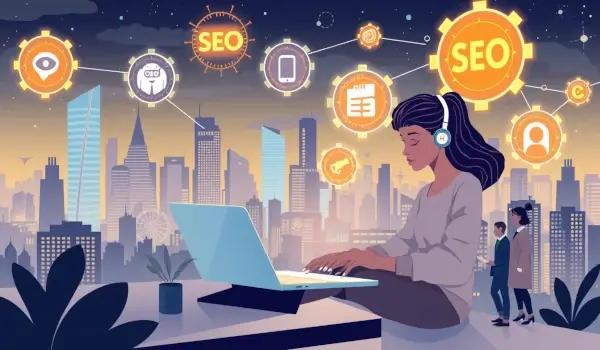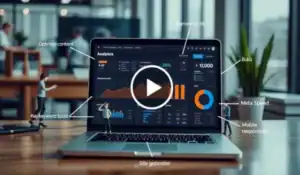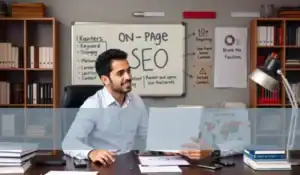The rise of AI in SEO, what bloggers must know in 2025, search engine optimization (SEO) is changing faster than ever. If you still rely on writing decent content and building outdated backlinks, you will likely fall behind. We are entering a new era of SEO, and your strategy must evolve to keep up. In this post, we’ll break down the two major shifts redefining SEO and introduce the most important strategy of the next few years: Generative Engine Optimization (GEO).
The End of Google-Only SEO
Then: One Search Engine to Rule Them All: Historically, SEO was all about Google. People searched on Google, and your entire SEO strategy revolved around ranking high on that single platform.
Now: Real Competition in Search: For the first time, we’re seeing real competition to Google—from tools like ChatGPT, Perplexity, and Google’s own AI Overviews. Your customers are no longer searching just on Google. They’re searching across AI tools. Your new goal: Ensure your products, services, and brand are found wherever people are searching.
Two SEO Strategies Are Now Essential for AI in SEO
Until recently, brands typically had one SEO strategy. But now, successful companies are creating two distinct methods:
A. Top-of-Funnel SEO: This strategy focuses on visibility during the research phase, when people are asking broad or exploratory questions.
B. Bottom-of-Funnel SEO: This targets users ready to convert, those searching with purchase intent. Both of these require different tactics, especially in a world where AI is doing much of the user’s research for them.
Introducing GEO: Generative Engine Optimization
GEO is the next big thing in search marketing. It refers to optimizing your business to be recommended by generative AI tools like ChatGPT, Perplexity, and Google’s AI Overviews.
Why GEO Matters?
By the end of 2024, over 1 billion people will be using Google’s AI Overviews. And these AI tools are already affecting how people discover information. For example, even if your website ranks #3 in organic search, you might be #1 in the AI overview. But the rules for each are different.
How to Optimize for AI Tools (GEO Basics)?
A. Start With Traditional SEO
AI Overviews often rely on regular search results. To be featured, you must first rank in traditional search.
- Earn featured snippets
- Target long-tail, specific queries
- Build topical authority
- B. Create AI-Friendly Content Structures
Study how AI answers are structured. Often they:
- Start with a concise summary
- Follow with a detailed explanation
Structure your content in the same way to increase the chances of being referenced.
AI Loves Experience and Authority
AI tools—and Google—prefer content written by people with real-world experience.
- Tips to Show Experience:
- Add author bios with credentials
- Show content review dates
- Include firsthand videos, photos, or case studies
Example: A lawn care brand ranking #1 used videos from the founder explaining each product from personal use.
Digital PR is the New Backlink Building
AI tools gather data from multiple trusted sources, not just your site. So you need to be visible across the web.
- Actions: Get featured in listicles, reviews, and news
- Run polls or studies and pitch results to the media
- Partner with bloggers and forums in your niche
Even if AI isn’t citing your site directly, you can still win by being one of the sources they pull from.
Your Organic Traffic May Drop (And That’s Okay)
Even if you’re doing SEO right, your organic traffic might decline because AI is answering questions before users click. That’s why you need to think in two parts:
- Top/Mid-Funnel: Win recommendations in AI-generated answers.
- Bottom-Funnel: Target users with high intent who are ready to click and buy,
The Power of E-E-A-T in the AI Age
Google has long emphasized E-E-A-T:
- Experience
- Expertise
- Authoritativeness
- Trustworthiness and AI in SEO
And now, AI tools care about these too. So bake these into your site and AI in SEO.
How:
- Add expert bios
- Show real reviews
- Cite credible sources
- Keep your content up to date
- Create unique media (videos, tutorials, etc.)
Think Bigger: Visibility Beyond Search
SEO is no longer just about ranking on Google—it’s about brand visibility everywhere AI in SEO:
- Run petitions or campaigns on issues your audience cares about
- Create newsworthy PR angles and the AI in SEO
- Be featured on third-party sites and comparison pages
- The more AI sees your brand on trusted platforms, the more likely it is to recommend you AI in SEO.
- 10. Voice Search? Still Not a Game-Changer (Yet)
- Every year, someone asks, “Is this the year of voice search?”
- Maybe… but not really.
Most voice searches are still basic (“What’s the weather?”), And they aren’t high-converting. Focus on visual, AI-powered searches instead—where the real traffic and conversions are going.
Conclusion
We’re witnessing one of the most profound shifts in search since the early days of Google Ads. Generative AI tools are now deciding what to recommend, and your SEO strategy needs to reflect that.
- To win the future of SEO:
- Embrace GEO now and AI in SEO
- Show real expertise
- Build digital PR and AI in SEO
- Tailor your content for AI consumption
- If you’re not optimizing for AI search today, you’re already behind.






